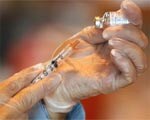Vaccinating infants against rotavirus could save the lives of millions of children in developing nations who would otherwise die from the diarrhoea-causing disease.

Vaccinating infants against rotavirus could save the lives of millions of children in developing nations who would otherwise die from the diarrhoea-causing disease.
Rotavirus is the most common cause of severe gastroenteritis (vomiting and diarrhoea) among young children worldwide. More than half a million children die each year from rotavirus infection, according to the World Health Organization (WHO). Though there are many gastrointestinal diseases that can cause life-threatening diarrhoea, this virus is among the most common. Among children hospitalised for severe diarrhoea, it is implicated as the culprit in about 40 percent of cases globally.
To evaluate the efficacy of rotavirus vaccine in preventing severe rotavirus gastroenteritis, researchers studied healthy infants aged 5-10 weeks in Malawi and South Africa. They divided 4939 infants into three equal groups: one group received three doses of the vaccine, the second received two doses and the last group 3 doses of a placebo. The researchers then followed-up with weekly home visits and took stool samples to confirm suspected rotavirus infections.
It was found that the vaccine prevented severe rotavirus gastroenteritis both in infants who received two doses or three of the vaccine with vaccinated children being 61 percent less likely to develop severe rotavirus infection. In Malawi, the effectiveness was 49 percent, compared to about 77 percent in South Africa. This study shows that a rotavirus vaccine significantly reduces the episodes of severe rotavirus gastroenteritis in African children during the first year of life.
The overall efficacy of the vaccine was lower than that observed in European studies and Latin American studies and possible reasons include poor nutritional status, coinfections, levels of antirotavirus antibodies in breast milk, and interference by maternal antibody or by coadministration of the oral poliovirus vaccine, which may reduce rotavirus antibody levels.
The WHO recommends that rotavirus vaccination of infants be included in all national immunisation programs, in conjunction with other proven interventions for diarrheal disease and infants should receive the first dose of the vaccine between 6 and 15 weeks.
DoctorNDTV is the one stop site for all your health needs providing the most credible health information, health news and tips with expert advice on healthy living, diet plans, informative videos etc. You can get the most relevant and accurate info you need about health problems like diabetes, cancer, pregnancy, HIV and AIDS, weight loss and many other lifestyle diseases. We have a panel of over 350 experts who help us develop content by giving their valuable inputs and bringing to us the latest in the world of healthcare.












